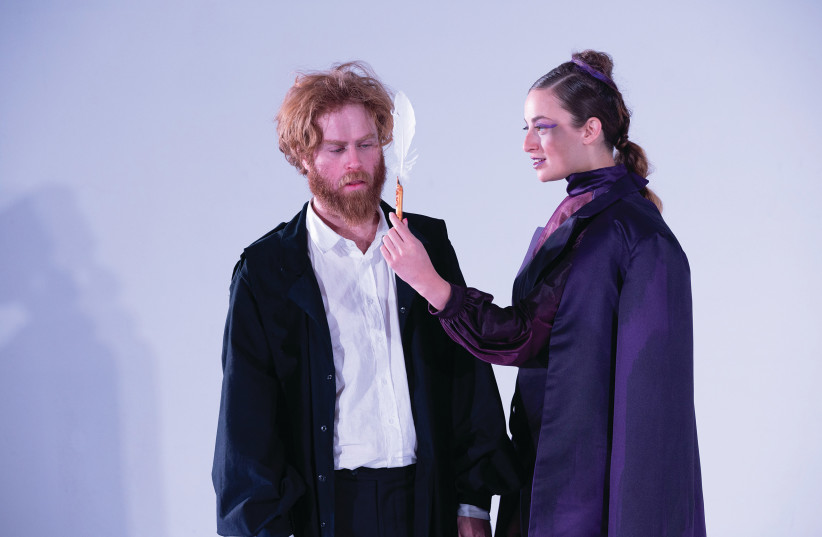Weary of learning, Faustus (Amit Braverman) sits amid piles of books, the four corners of his earth. “Is, to dispute well, logic’s chiefest end?” He wonders. “Affords this art no greater miracle?” Refusing to “live and die in Aristotle’s works” he masters forbidden arts to beseech Hell. A demoness (Shiri Blustein) in purple, a splash of color in his black-and-white world, responds. Offer your soul to Hell, Blustein-as-Mephistopheles offers, seal the deal with blood, and attain your desires.
At Tel Aviv University Theater, director Yochay Hacher presented Christopher Marlowe’s Doctor Faustus as his ambitious graduation project. The Elizabethan play, in the Hebrew translation of Meir Wieseltier, is a multi-layered exploration. Hacher boldly chose a hoary, difficult work, packed with disappointment from academia, to prove his mettle to his instructors in theater arts.
His adaptation is marvelous, full of tiny, precise miracles. The corruption of Faustus is like a slow swamp of colors that pulls us in. His university peers, blinded by his charisma, begin to wear colorful scarves on their black and white academic dress. Stage designer Lital Kaploon created a paper-covered stage for this production. As each scene was acted, some paper was torn and a glimpse of the hot paint beneath was seen. The maw of the inferno Faustus will enter.
A marvelous adaptation with a genius portrayal of Hell
Marlowe’s genius is in showing Hell has no real gifts. Working for a short spell with Lucifer’s power, Faustus can present grapes during wintertime and show Helen of Troy upon request. Yet the grapes are swiftly imported from another part of the earth by spirits and Helen is, in truth, Mephistopheles in a pleasing shape.
The authentic magic of creation, real grapes from the vine, is beyond Lucifer. When Wagner (Liran Biton), a foolish youngster, attempts to copy Faustus and conjure wine from thin air into a dry goblet, Mephistopheles takes the grapes and squeezes them.

HELL CAN only work with the limited things God made or humans already think of. Poor Wagner, who spent twenty years casting spells, could have amassed and drunk a hundred barrels by the sweat of his brow had he been willing to spend those years working.
Lucifer (Noy Schwartz) is skilled at offering us what we already have. Faustus is an academic and is tempted by knowledge. A magic book that contains all that he ever wanted to know. Cornelius (Rami Mario Salman), here shown as a university dean, wants to see an ancient Greek mathematician he adores. When he returns from his grand tour, Faustus describes all that he saw with a colorful scarf tied tight around his eyes. In truth, he saw nothing but his own fantasies of Paris and Venice.
Hell is where the dead are and serves as a repository of all human history. When Odysseus enters the underworld to learn how he may return home he meets the specter of his dead mother, Anticleia. She died of a broken heart when her son did not return. Dante describes the gates of Hell as open, hinting that those who are there are, in a way, choosing to stay.
Hacher chose to present Faustus as a director and the gifts of hell as the empty magic tricks of the stage. As an evil temptress, Blustein is stunning. Biton deserves applause for a difficult supporting role done well. Braverman’s wizard is a rich study in male power and cunning. The role is very different from his previous role at University Theater as a docile Jewish shop keeper who falls to his death in Martin Sherman’s Messiah (Directed by Guy Israeli, last year).
“Where we are is Hell,” explains Mephistopheles to Faustus, then offers him infernal knowledge purchased for his eternal soul. When he asks why Lucifer needs souls she says Solamen miseris socios habuisse doloris (misery loves company). Wieseltier gives it in Hebrew, “It is less painful to suffer with another.”
Doctor Faustus by Christopher Marlowe is shown at Tel Aviv University Theater, which is inside the Art Gallery (64 Chaim Levanon St., near Gate 7). Hebrew performance without English subtitles, 90 minutes long, no intermission. Shown on Monday, February 20, at 8:30 p.m. Tuesday, February 21, at 4:30 p.m., and Wednesday, February 22, at 8:30 p.m. Be on time, patrons will not be admitted after the performance begins. Tickets range from NIS 30-50. For tickets, visit: www.bit.ly/tautkts.
